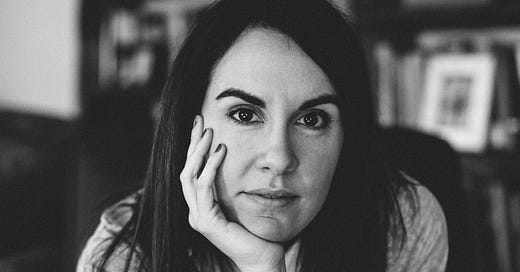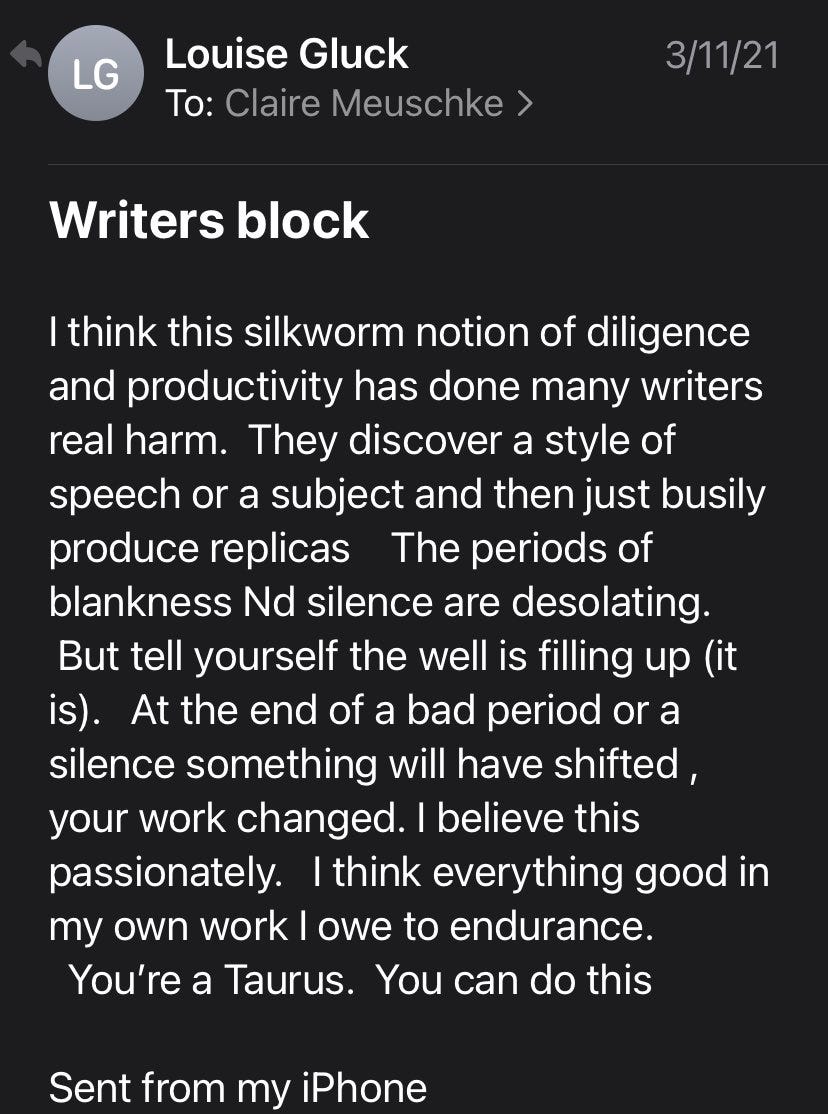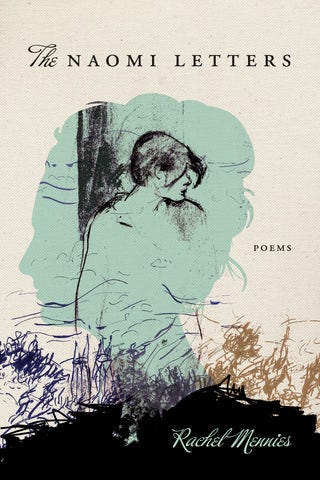Resisting "the silkworm notion of diligence & productivity"
an interview with poet, writer & editor Rachel Mennies
Today, I’m excited to share an interview with poet, writer & editor, Rachel Mennies, which digs into her writing and mindfulness practices. I’d love your suggestions of other people I might feature here, so feel free to email me with ideas. You can just reply to this newsletter.
I met Rachel over a decade ago when we happened to sit next to each other in the adjunct instructor orientation for Carnegie Mellon’s first-year writing program. We were the only poets in a group of Rhetoric and Composition PhD students. She was carrying a Poetry tote bag, which I complimented, and that was that. Rachel was new-ish to Pittsburgh, so I pulled her into the Madwomen in the Attic writing workshops, then we ended up in the same small poetry workshop group for many years while she wrote The Naomi Letters (one of my favorite poetry collections full stop). Once a month, we’d drive together to Tess Barry’s house on the South Side and eat and drink and laugh and talk poems. I found that I looked forward to our rambling conversations on the 20 minute drives there and back as much as I did our workshop time.
Rachel is one of the sharpest, most original thinkers and writers I know. I’ve learned so much from her work over the years. Writer sam sax says of The Naomi Letters, “At once grief-limned, sharp, and funny, this book explores the desires, obsessions, and limitations of the writing body negotiating history on this particular planet sprinting toward the unknown.” Rachel is never one to accept received notions about the world; her poems use language to pull back our layers of accumulated surface-level meaning to see the truths lying underneath. There is a wildness that is loosely contained and on the verge of breaking free in every Rachel Mennies poem. If you don’t know her work, here are two recent poems of hers published at Poetry Foundation; & here’s another one of my favorites at poets.org. I hope you gain as much as I did from Rachel’s approach to writing and mindfulness. Read on, friends.
What is your writing practice like? Do you have any writing rituals?
I used to be devoted to the idea of a regular writing practice, and I think part of that comes from productivity culture: from feeling like I needed to hit certain benchmarks at certain times in my life to advance in my career. For a long time, I thought I wanted to remain in academia, so publishing on a schedule became this really important part of my writing practice. And a lot changed during lockdown, in part because I was no longer teaching. I'd taken about a one year break from teaching at that point and was exploring working for myself, which I'm still doing, and part of it is because lockdown just changed everything about my writing practice. It took me away from my writing practice: I didn't write for an entire year. Coming back to a writing practice, I have been handwriting a lot more. I've been writing in notebooks. I've been trying only to move writing onto a screen when I feel like I have a lot to transcribe, in part because I just got so burned out on screens during lockdown, but also because I didn't have stimuli, any real subject matter in the same way. Lockdown also happened to have started when I had just finished a book, The Naomi Letters, and it had been accepted for publication two months before the pandemic started. So I was also at a detente that I really leaned into.
I have this quote saved on my phone that the poet Claire Meuschke posted last month from an email that Louise Glück had sent to Meuschke, after Glück passed away. I screenshotted it and I've come back to it so many times just in the last month, in terms of the idea of the importance of fallow periods to writing.
I am so into this idea of endurance versus productivity: that we endure and we survive, and we notice in these “fallow” periods or blankness or silences instead of feeling like we must brute-force our way through making art because of some received idea that productivity is better. That producing is better than not producing.
What kind of writing are you working on? Are you working on specific projects or journaling or something else?
I am in a revision era right now. I am working on a new book. I have enough poems to make up a manuscript, and I'm trying to move into “what is this entire project doing as a book?” as opposed to “here are all the poems I wrote in the last three years.” So that is taking up the bulk of my creative energy right now. I am trying desperately to start a practice of journaling or morning pages. That is how I wrote The Naomi Letters, which was through the act of morning pages, getting up really early and writing and trying to meet myself with the clearest head possible. I was in my early 30s back then. I am now in my late 30s. I will not do anything that takes away from my sleep. I will not wake up early and disrupt my sleep cycle to write, because I need sleep to function (including to write!) more than I did 8, 9, 10 years ago when I was just younger and was a chronic insomniac and was so used to running on empty. I just can't do that anymore. So I now write in the evening, or when I have an idea. I'm much more reliant on my notes app or my Voice Memo app in addition to a notebook.
What helps you when you get stuck with your writing?
Now: patience. Before: I would throw a lot of prompt work at myself. I think prompts are incredible. But what I learned about myself during lockdown when I was really stalling is the reason that I was not writing was because of the circumstances I was in—the lower-pyramid parts of my life I needed to attend to. I was having trouble showering every day. I was having trouble wanting to get out of bed and greet the day. That was not writer's block; that was circumstance-driven depression. I do not have chronic depression, but I do have OCD and chronic anxiety. I have learned that sometimes being stuck with your writing is just a question of needing to read more, needing to get out in the world and expose yourself to ideas and sort of immerse yourself in other creativities—and sometimes it's because there are things more fundamental or basic in your life that are not working. And learning to differentiate between those has been really helpful for me, per the earlier quote I shared from Glück, is that sometimes it is not possible to have a regular writing practice and be constantly productive, and so in that case, I wouldn't call that being stuck. I would call that needing to tend to other more basic fundamental aspects of self-care and survival.
What are your mindfulness practices?
As I've gotten older, I reluctantly am becoming more of a cosigner of regular exercise. I try to think of it as "moving the meat"—like, I need to get up and move the meat, I need to take the "brain in a jar" that I sometimes imagine my human form to be and let that idea go and be like No, you live in a body. This body needs movement. It needs oxygen, it needs care. I don't know if that's a mindfulness practice or an embodied practice, but it really helps me to access the endorphins that I get from exercise for my mental illness. It really helps me feel tired at the end of the day when my mind is just like, booming and zooming. If the meat sack is tired, then I will usually sleep better. So some of that for me is yoga, walking, cycling. I have a dog, so if it's a beautiful day here in Chicago, going out for a long walk with the dog is absolutely a meditative mindful practice.
I have not really been able to connect my own spirituality to these things, but I'm always fascinated to hear from others that do. For me, because my brain is always moving at 1000 miles an hour as an anxious person, mindfulness is actually much more about embodiment: slowing my brain down and existing in my body versus things like meditation or gratitude work, which the OCD tends to sort of garble. It's not that it's not helpful for me, but it's not something I reach for in the same way as working out for a half an hour. I need to go for a long walk, I need to stretch, that sort of thing.
How often do you practice mindfulness and when/where?
I would say my that the above question kind of hits this, but I try not to let it get to a point where I'm like, oh my god, your body is crying out for some sort of embodied attention. And I try to integrate it into my day. Almost every day.
What do you do when a mindfulness practice doesn't seem to be working?
I try to meet that feeling with patience instead of kind of pushing through and I'm not totally sure if I have this one figured out yet again. I'm in therapy, I am on SSRIs, and I really struggle with mindfulness as a mentally ill person. And so I would say my mindfulness practice doesn't work all of the time. It is actually a problem for my brain to be mindful and be present. So I kind of feel like I operate in this space more often than not, but usually, if I'm really struggling with it, if it's impeding my day to day life, I will take a moment and say, Hey, what do you need right now? Do you need to take a nap? Do you need to go for a walk? I almost feel like a toddler or my own dog, but sometimes it helps me to think of myself that way.
Do you see your writing and mindfulness practices as connected and in what ways?
I do see my writing and mindfulness practices as connected in that they are two sides of the same coin. When I need to stop being a brain in a jar and release some energy, I think writing is probably the closest thing I have found—unlike things like meditation or gratitude work—to plumb the depths of the brain in a jar in a way that feels safe and important and like an expression of myself. I don't always come away from a writing session feeling relaxed or mindful, but I do come away from a successful writing session, where I feel like I've done something interesting, like I know myself better and I can see and have empathy for myself in a new way. So in that way, I do see them as connected, but in some ways, they're very different in that one is entirely happening in my mental space and the other is happening almost entirely in my physical embodied space.
Two prompts from Rachel:
The Oracle Bookshelf:
What really helped me while writing The Naomi Letters when I was doing my morning pages is something that I call "the oracle bookshelf," where I will just look for a book that I've read before that I know that I've loved and open to a random page and read a poem and then try to write some sort of response to that poem. And I don't usually mean I'm actually engaging with the subject matter of the poem. Sometimes it's taking a line from the poem and using it as a prompt or the opening or the title of a piece. Sometimes it's thinking about who the speaker is and writing directly to that speaker. Sometimes it's just really admiring the language. And I like to think of this as stretching before a workout where you're reading work that you love, and it is engaging the parts of your brain that can access why you love the piece of work that you're reading, and help to kind of warm up or rev up the image-making or idea-making parts of your brain.
Four-Count Breathwork (box or square breathing):
The other one I do is simply to sit cross-legged against a wall (or any comfortable position) and put a hand on my chest and a hand on my belly and breathe in a four count: in for a four-count, hold for a four-count, out for a four-count, hold for a four-count. This is not so much a writing prompt, but it is a way for me to calm down when I feel like my nervous system is just exploding with fireworks, which happens a lot to me as an anxious person—the breath work can help me to feel really grounded. Sometimes I need to write, but sometimes I just need to function, to literally go about my day. The breath work is something I learned from doing yoga for many years, and it's one of the pieces of the broader practice of yoga that I really find helpful in needing to take a beat and clear out what Glück calls the silkworm productivity notion, the sort of insane—I think—commitment we have in western capitalist society to constantly be producing and creating, to just: stop. It is its own sort of prompt.
Rachel Mennies is the author of the poetry collections The Naomi Letters (BOA Editions, 2021); The Glad Hand of God Points Backwards, the 2014 winner of the Walt McDonald First-Book Prize in Poetry at Texas Tech University Press and finalist for a National Jewish Book Award; and No Silence in the Fields, a chapbook from Blue Hour Press. Her poetry has recently appeared at Poetry Magazine, The Believer, Kenyon Review, American Poetry Review, and elsewhere. Rachel's essays, criticism, and other articles have appeared, or will soon, at The Millions, The Poetry Foundation, LitHub, and numerous other outlets.
Rachel took over for Robert Fink in 2016 as the series editor of the Walt McDonald First-Book Prize in Poetry; she also serves as the reviews editor for AGNI. Alongside the poet Ruth Awad, she edited the anthology The Familiar Wild: On Dogs and Poetry for Sundress Publications (2020). She served as the 2021-2022 Walton Visiting Writer in Poetry for the University of Arkansas MFA Program in Creative Writing and Translation. As an adjunct professor, she's taught creative writing, rhetoric/composition, professional writing, and writing pedagogy at Carnegie Mellon University, Chatham University, Penn State University, and Loyola University Chicago.
Rachel currently works as a freelance editor and writer. She's the owner of The Little Book, a one-person company that provides writing and editing services to individuals, nonprofits, and businesses of all sizes. She lives in Chicago with her spouse and her greyhound Otto.
Be Where You Are is a newsletter about how to use writing and mindfulness to be where you are. If you have ideas to share for future newsletters, you can reply to this email or email me at emilymohnslate@gmail.com. You can support this newsletter by liking, commenting & sharing it with other people. You can also find me on Instagram or Facebook or find more info at my website. Thank you for reading!







hi Emily! I'm a doctoral student in clinical psychology and focused on acceptance and committment therapy which highlights mindfulness. I also use journaling and mindfulness practice to be a better spouse, parent, and clinician. If you ever want to interview me, I'm game for it! Best, Kay
Great interview--thanks for sharing the Gluck quote. This (and the blank time Covid given me) inspired me go back and reread The Naomi Letters. It's such a beautiful book of love and obsession and trying to find your self through another. Thanks Emily and yay Rachel!!